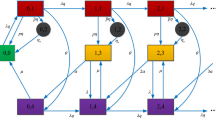Appendix :
Some part of the computational algorithm is presented below. Appendix A1 presents the derivation of ζ
n,z
and \(\zeta _{n,z}^{(l)}\). The computation of e
n,z
, f
n,z
and \(e_{n,z}^{(l)},~f_{n,z}^{(l)}\) is presented in A2.
1.1 A1 Calculation of ζ
n,z
and \(\zeta _{n,z}^{(l)}\)
For n=N,
$$\begin{array}{@{}rcl@{}} \zeta_{N,z}& =& \left\{ \begin{array}{l} \bar\phi A^{*(1)}(z)\left(\bar\gamma_{N-1}\psi_{N-1}+\bar\gamma_{N}\psi_{N}\right), ~z=\delta_{N},\\ \frac{\bar\phi A^{*}(z)(\bar\gamma_{N-1}\psi_{N-1}+\bar\gamma_{N}\psi_{N})-\bar\phi\bar\gamma_{N}\psi_{N}}{z-\delta_{N}}, ~z\neq\delta_{N}, \end{array} \right. \\\\ \zeta_{N,z}^{(l)}&= &\left\{ \begin{array}{l} \frac{\bar\phi A^{*(l+1)}(z)\left(\bar\gamma_{N-1}\psi_{N-1}+\bar\gamma_{N}\psi_{N}\right)}{l+1}, ~z=\delta_{N},\\ \frac{\bar\phi A^{*(l)}(z)(\bar\gamma_{N-1}\psi_{N-1}+\bar\gamma_{N}\psi_{N})-l\zeta_{N,z}^{(l-1)}}{z-\delta_{N}}, ~z\neq\delta_{N}. \end{array} \right. \end{array} $$
For n=N−1,
$$\begin{array}{@{}rcl@{}} \zeta_{N-1,z}& =& \left\{ \begin{array}{l} \bar\phi A^{*(1)}(z)\left(\gamma_{N-1}\psi_{N-1}+\bar\gamma_{N-2}\psi_{N-2}+\gamma_{N}\psi_{N}\right) \\+\bar\phi\gamma_{N}\zeta_{N,z}^{(1)} ,~z=\delta_{N-1},\\ \frac{\bar\phi\psi_{N-1} \left(\gamma_{N-1}A^{*}(z)-\bar\gamma_{N-1}\right)+\bar\phi\gamma_{N}\zeta_{N,z} }{z-\delta_{N-1}}\\ +\frac{\bar\phi A^{*}(z)\bar\gamma_{N-2}\psi_{N-2}+\gamma_{N}\bar\phi\psi_{N}\left( A^{*}(z)-1\right)}{z-\delta_{N-1}}, z\neq\delta_{N-1}, \end{array} \right. \\\\ \zeta_{N-1,z}^{(l)}& =& \left\{ \begin{array}{l} \bar\phi A^{*(l+1)}(z)\left(\gamma_{N-1}\psi_{N-1}+\bar\gamma_{N-2}\psi_{N-2}+\gamma_{N}\psi_{N}\right) \\+\bar\phi\gamma_{N}\zeta_{N,z}^{(l+1)} , ~z=\delta_{N-1},\\ \frac{\bar\phi A^{*(l)}(z) \left(\bar\gamma_{N-2}\psi_{N-2}+\gamma_{N-1}\psi_{N-1}+\gamma_{N}\psi_{N}\right)}{z-\delta_{N-1}}\\ +\frac{\bar\phi\gamma_{N}\zeta_{N,z}^{(l)}-l\zeta_{N-1,z}^{(l-1)}}{z-\delta_{N-1}}, ~~z\neq\delta_{N-1}. \end{array} \right. \end{array} $$
For 1≤n≤N−2,
$$\begin{array}{@{}rcl@{}} \zeta_{n,z}& =& \left\{ \begin{array}{l} \bar\phi A^{*(1)}(z)\left(\gamma_{n}\psi_{n}+\bar\gamma_{n-1}\psi_{n-1}\right)+\bar\phi\gamma_{n+1}\zeta_{n+1,z}^{(1)} , ~z=\delta_{n},\\ \frac{\bar\phi\psi_{n}\left(\gamma_{n}A^{*}(z)-\bar\gamma_{n}\right) +\bar\phi\gamma_{n+1}\left(\zeta_{n+1,z}-\psi_{n+1}\right)}{z-\delta_{n}} \\+\frac{\bar\phi A^{*}(z)\bar\gamma_{n-1}\psi_{n-1}}{z-\delta_{n}}, ,~z\neq\delta_{n}, \end{array} \right. \\\\ \zeta_{n,z}^{(l)}& =& \left\{ \begin{array}{l} \frac{\bar\phi A^{*(l+1)}(z)\left(\gamma_{n}\psi_{n}+\bar\gamma_{n-1}\psi_{n-1}\right)+\bar\phi\gamma_{n+1}\zeta_{n+1,z}^{(l+1)}}{l+1} , ~z=\delta_{n},\\ \frac{\bar\phi A^{*(l)}(z)\left(\gamma_{n}\psi_{n}+\bar\gamma_{n-1}\psi_{n-1}\right) +\bar\phi\gamma_{n+1}\zeta_{n+1,z}^{(l)}-l\zeta_{n,z}^{(l-1)}}{z-\delta_{n}} , z\neq\delta_{n}, \end{array} \right. \end{array} $$
1.2 A2 Calculation of e
n,z
,f
n,z
and \(e_{n,z}^{(l)}, f_{n,z}^{(l)}\)
For n=N,
$$\begin{array}{@{}rcl@{}} e_{N,z}& =& \left\{ \begin{array}{l} \phi A^{*(1)}(z)(\bar\gamma_{N-1}\psi_{N-1} +\bar\gamma_{N}\psi_{N}) +\phi\bar\gamma_{N}\zeta_{N,z}^{(1)}\\ +A^{*(1)}(z)\bar\mu_{N-1}t_{N-1}, ~z=\bar\mu_{N},\\ \frac{\phi A^{*}(z)(\bar\gamma_{N-1}\psi_{N-1} +\bar\gamma_{N}\psi_{N}) +\phi\bar\gamma_{N}\zeta_{N,z}+A^{*}(z)\bar\mu_{N-1}t_{N-1}}{z-\bar \mu_{N}}\\ -\frac{\phi\bar\gamma_{N}\psi_{N}}{z-\bar\mu_{N}} ,~z\neq\bar\mu_{N}, \end{array} \right. \\\\\\f_{N,z}& =& \left\{ \begin{array}{l} A^{*(1)}(z)(\bar\mu_{N-1}d_{N-1}+\bar\mu_{N}d_{N}), ~z=\bar\mu_{N},\\ \frac{A^{*}(z)(\bar\mu_{N-1}d_{N-1}+\bar\mu_{N}d_{N})-\bar\mu_{N}d_{N}}{z-\bar \mu_{N}} ,~z\neq\bar\mu_{N}, \end{array} \right. \\\\\\e_{N,z}^{(l)}& =& \left\{ \begin{array}{l} \frac{\phi A^{*(l+1)}(z)(\bar\gamma_{N-1}\psi_{N-1} +\bar\gamma_{N}\psi_{N}) +\phi\bar\gamma_{N}\zeta_{N,z}^{(l+1)}}{(l+1)}\\+\frac{A^{*(l+1)}(z)\bar\mu_{N-1}t_{N-1}}{(l+1)}, ~z=\bar\mu_{N},\\ \frac{\phi A^{*(l)}(z)(\bar\gamma_{N-1}\psi_{N-1} +\bar\gamma_{N}\psi_{N}) +A^{*(l)}(z)\bar\mu_{N-1}t_{N-1}}{z-\bar \mu_{N}}\\ +\frac{\phi\bar\gamma_{N}\zeta_{N,z}^{(l)}-l e_{N,z}^{(l-1)}}{z-\bar\mu_{N}} ,~z\neq\bar\mu_{N}, \end{array} \right. \\\\\\f_{N,z}^{(l)}& =& \left\{ \begin{array}{l} \frac{A^{*(l+1)}(z)(\bar\mu_{N-1}d_{N-1}+\bar\mu_{N}d_{N})}{(l+1)}, ~z=\bar\mu_{N},\\ \frac{A^{*(l)}(z)(\bar\mu_{N-1}d_{N-1}+\bar\mu_{N}d_{N})-lf_{N,z}^{(l-1)}}{z-\bar \mu_{N}} ,~z\neq\bar\mu_{N}. \end{array} \right. \end{array} $$
For n=N−1,
$$\begin{array}{@{}rcl@{}} e_{N-1,z}& =& \left\{ \begin{array}{l} \phi A^{*(1)}(z)(\bar\gamma_{N-2}\psi_{N-2}+\gamma_{N-1}\psi_{N-1} +\gamma_{N}\psi_{N}) +\phi\bar\gamma_{N-1}\zeta_{N-1,z}^{(1)} \\+\phi\gamma_{N}\zeta_{N,z}^{(1)}+\mu_{N}e_{N,z}^{(1)} +A^{*(1)}(z)(\bar\mu_{N-2}t_{N-2}+\mu_{N-1}t_{N-1}),\!z=\bar\mu_{N-1},\\ \frac{\phi A^{*}(z)(\bar\gamma_{N-2}\psi_{N-2}+\gamma_{N-1}\psi_{N-1} +\gamma_{N}\psi_{N})+\phi\bar\gamma_{N-1}\zeta_{N-1,z}}{z-\bar \mu_{N}}\\ -\frac{\phi(\bar\gamma_{N-1}\psi_{N-1} +\gamma_{N}\psi_{N})+A^{*}(z)(\bar\mu_{N-2}t_{N-2}+\mu_{N-1}t_{N-1} )}{z-\bar \mu_{N-1}} \\+\frac{\phi\gamma_{N}\zeta_{N,z}+\mu_{N}e_{N,z}-\bar\mu_{N-1}t_{N-1}}{z-\bar \mu_{N-1}} ,~z\neq\bar\mu_{N-1}, \end{array} \right. \\\\\\f_{N-1,z}& =& \left\{ \begin{array}{l} \mu_{N}f_{N,z}^{(1)}+A^{*(1)}(z)\left(\bar\mu_{N-2}d_{N-2} +\mu_{N-1}d_{N-1}+\mu_{N}d_{N}\right), ~z=\bar\mu_{N-1},\\ \frac{\mu_{N}f_{N,z}+A^{*}(z)\left(\bar\mu_{N-2}d_{N-2} +\mu_{N-1}d_{N-1}+\mu_{N}d_{N}\right)}{~z-\bar\mu_{N-1}}\\ -\frac{\mu_{N}d_{N}-\bar \mu_{N-1}d_{N-1}}{~z-\bar\mu_{N-1}} ,~z\neq\bar\mu_{N-1}, \end{array} \right. \end{array} $$
$$\begin{array}{@{}rcl@{}} e_{N-1,z}^{(l)}& =& \left\{ \begin{array}{l} \frac{\phi A^{*(l+1)}(z)(\bar\gamma_{N-2}\psi_{N-2}+\gamma_{N-1}\psi_{N-1} +\gamma_{N}\psi_{N}) }{l+1}\\+\frac{\mu_{N}e_{N,z}^{(l+1)}+A^{*(l+1)}(z)(\bar\mu_{N-2}t_{N-2}+\mu_{N-1}t_{N-1})}{l+1} \\+\frac{\phi(\bar\gamma_{N-1}\zeta_{N-1,z}^{(l+1)}+\gamma_{N}\zeta_{N,z}^{(l+1)})}{(l+1)}, ~z=\bar\mu_{N-1},\\ \frac{\phi A^{*(l)}(z)(\bar\gamma_{N-2}\psi_{N-2}+\gamma_{N-1}\psi_{N-1} +\gamma_{N}\psi_{N}) +\mu_{N}e_{N,z}^{(l)}}{z-\bar \mu_{N-1}}\\ +\frac{\phi(\bar\gamma_{N-1}\zeta_{N-1,z}^{(l)}+\gamma_{N}\zeta_{N,z}^{(l)})+A^{*(l)}(z)(\bar\mu_{N-2}t_{N-2}+\mu_{N-1}t_{N-1})}{z-\bar \mu_{N-1}}\\ -\frac{le_{N-1,z}^{(l-1)}}{z-\bar \mu_{N-1}} ,~z\neq\bar\mu_{N-1}, \end{array} \right. \\\\f_{N-1,z}^{(l)}& =& \left\{ \begin{array}{l} \frac{A^{*(l+1)}(z)\left(\bar\mu_{N-2}d_{N-2} +\mu_{N-1}d_{N-1}+\mu_{N}d_{N}\right)}{(l+1)}\\+\frac{\mu_{N}f_{N,z}^{(l+1)}}{(l+1)} ,~z=\bar\mu_{N-1},\\ \frac{\mu_{N}f_{N,z}^{(l)}+A^{*(l)}(z)\left(\bar\mu_{N-2}d_{N-2} +\mu_{N-1}d_{N-1}+\mu_{N}d_{N}\right)}{~z-\bar\mu_{N-1}}\\ - \frac{le_{N-1,z}^{(l-1)}}{~z-\bar\mu_{N-1}} ,~z\neq\bar\mu_{N-1}. \end{array} \right. \end{array} $$
For 1≤n≤N−2,
$$\begin{array}{@{}rcl@{}} e_{n,z}& =& \left\{ \begin{array}{l} \phi\left\{\gamma_{n+1} \zeta_{n+1,z}^{(1)}+\bar\gamma_{n} \zeta_{n,z}^{(1)} +A^{*(1)}(z)(\gamma_{n}\psi_{n}+\bar\gamma_{n-1}\psi_{n-1})\right\}\\+ \mu_{n+1}e_{n+1,z}^{(1)}+A^{*(1)}(z)(\bar\mu_{n-1}t_{n-1}+~\mu_{n}t_{n}), ~z=\bar\mu_{n},\\ \frac{\phi\left\{\gamma_{n+1} \zeta_{n+1,z}+\bar\gamma_{n} \zeta_{n,z}-(\gamma_{n+1}\psi_{n+1}+\bar\gamma_{n}\psi_{n}) \right\}+\mu_{n+1}e_{n+1,z}}{z-\bar\mu_{N-1}}\\ +\frac{A^{*}(z)(\gamma_{n}\psi_{n}+\bar\gamma_{n-1}\psi_{n-1})+A^{*}(z)(\bar\mu_{n-1}t_{n-1}+\mu_{n}t_{n})}{z-\bar\mu_{n}} \\ -\frac{(\mu_{n+1}t_{n+1}+\bar\mu_{n}t_{n})}{z-\bar\mu_{N-1}},~z\neq\bar\mu_{n}, \end{array} \right.\\ \\\\f_{n,z}& =& \left\{ \begin{array}{l} \mu_{n+1}f_{n+1,z}^{(1)}+A^{*(1)}(z)\left(\bar\mu_{n-1}d_{n-1} +\mu_{n}d_{n}\right), ~z=\bar\mu_{n},\\ \frac{\mu_{n+1}f_{n+1,z}+A^{*}(z)\left(\bar\mu_{n-1}d_{n-1} +\mu_{n}d_{n}\right)}{~z-\bar\mu_{n}}\\-\frac{(\bar \mu_{n}d_{n}+ \mu_{n+1}d_{n+1})}{~z-\bar\mu_{n}} ,~z\neq\bar\mu_{n}, \end{array} \right. \end{array} $$
$$\begin{array}{@{}rcl@{}} e_{n,z}^{(l)}& =& \left\{ \begin{array}{l} \phi\left\{\gamma_{n+1} \zeta_{n+1,z}^{(l+1)}+\bar\gamma_{n} \zeta_{n,z}^{(l+1)} +A^{*(l+1)}(z)(\gamma_{n}\psi_{n}+\bar\gamma_{n-1}\psi_{n-1})\right\}\\+ \mu_{n+1}e_{n+1,z}^{(l+1)}+A^{*(l+1)}(z)(\bar\mu_{n-1}t_{n-1}+~\mu_{n}t_{n}), ~z=\bar\mu_{n},\\ \frac{\phi\left\{\gamma_{n+1} \zeta_{n+1,z}^{(l)}+\bar\gamma_{n} \zeta_{n,z}^{(l)} +A^{*(l)}(z)(\gamma_{n}\psi_{n}+\bar\gamma_{n-1}\psi_{n-1})\right\}}{z-\bar\mu_{n}}\\+\frac{ \mu_{n+1}e_{n+1,z}^{(l)}+A^{*(l)}(z)(\bar\mu_{n-1}t_{n-1}+\mu_{n}t_{n})-le_{n,z}^{(l-1)}}{z-\bar\mu_{n}} ,~z\neq\bar\mu_{n}, \end{array} \right. \end{array} $$
$$\begin{array}{@{}rcl@{}} f_{n,z}^{(l)}& =& \left\{ \begin{array}{l} \mu_{n+1}f_{n+1,z}^{(l+1)}+A^{*(l+1)}(z)\left(\bar\mu_{n-1}d_{n-1} +\mu_{n}d_{n}\right), ~z=\bar\mu_{n},\\ \frac{\mu_{n+1}f_{n+1,z}^{(l)}+A^{*(l)}(z)\left(\bar\mu_{n-1}d_{n-1} +\mu_{n}d_{n}\right)-le_{n,z}^{(l-1)}}{~z-\bar\mu_{n}} ,~z\neq\bar\mu_{n}. \end{array} \right. \end{array} $$








